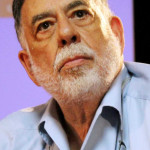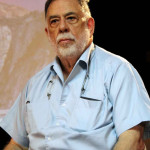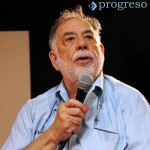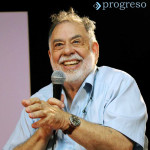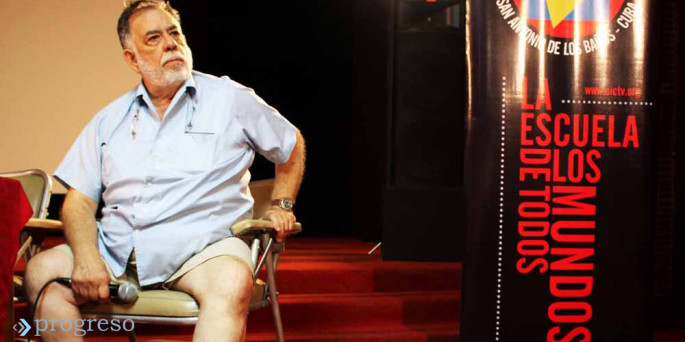
Coppola: ‘Cinema and television no longer exist: they’re one and the same’
Legendary filmmaker Francis Ford Coppola visited Cuba recently at the invitation of the International School of Cinema and Television in San Antonio de los Baños. Progreso Weekly was there.
*****
HAVANA — Francis Ford Coppola has won five Oscars; he is a script writer, producer, director of iconic films such as The Godfather. But he’s more; he is The Godfather.
He is a patriarch with the air of a wise, tired man who has lived, felt and dreamed a lot. He displays the kindness of a generous grandfather who spoils his grandchildren and the severity of a man who imposes respect with his mere presence.
When he sits down to talk, he occupies the entire space, not only with his corpulence but also with his energy, his spirit, his voice. He talks about his family, his work, art.
“Art has to resemble itself,” Coppola says. “It must be performed from its significance, with its own tools, from its own roots.
“Art has been canned and constantly reinterpreted and has brought us to a period where everything is processed. My theory is that something has been lost in the canning process.”
When painters did portraits, they had to picture the person before them. Then photography came and did the same in a more efficient manner. Painters then felt free to put on their canvases their impressions, their perceptions about the people they painted.
It may be the same with the cinema. In the past, everything had to be prepared, rehearsed and filmed with a specific vision; the moviegoer sees the editor’s pace, the director’s notion, the actors’ characterization. Coppola believes that today that could change.
“I want to experiment with a mixture of cinema and television, making movies live, without cutting, without montage, with live editing, blending both languages and using each medium’s technique. The result can only resemble itself.”
Does he mean a new cinematographic language?
“Five years ago, when Avatar was released, everyone was delighted and said that 3-D was the future of cinema and that soon all movies would be done that way. I don’t believe that the future of cinema is 3-D, which of course is not a 21st-Century invention. It has been around since the 1950s in films such as House of Wax. Hitchcock also did a movie with that technique.
[Translator’s Note: Dial M for Murder, 1954.]
“I do believe that there will be a new cinematographic language. It’s already being composed; it’s being born today in places like the International School of Cinema and Television (EICTV).
“What hasn’t changed are the subjects, which have forever kept creators busy, even if the ways of telling them have been transformed. They are the same things that preoccupied the big writers in centuries past, long before the cinema, on the stage. The cinema is a young language, very young when compared with the theatre, which is thousands of years old. But the grand subjects remain the same.”
The future of cinema in three steps
After delivering some reflections about the language of cinema, Coppola points out that its future is in the transformation of three areas: documentary, technology and the script.
“I speak of the documentary as a genre but I’m referring to the expressive possibilities of a hybrid of documentary and fiction, where the borders are increasingly more flexible.
“The documentary has evolved to a point where real stories can be told by occasionally utilizing the montage that is characteristic of fiction, resulting in beautiful movies about the great human themes.
“I like to mention the example of the young Canadian director Sarah Polley and her film Stories We Tell. It is a documentary where a family exposes its relations to the whole world and, as the story moves forward, it becomes so personal that, as a spectator, one feels strange looking at the screen, as if one were an intruder in that family’s home. I think that that kind of overreach is one of the keys to the cinema’s future.
“The other issue is technology, which seems to get ahead of us in every sense.
“When cinema began, it was silent and in black-and-white. Then came sound and cameras that filmed in color. With the passage from analog filming to the digital world, the creative possibilities of filmmakers increased exponentially, and today you can create an entire universe practically out of nothing with just one computer.
“It seems fundamental that one single person should create his entire movie, or at least have the tools to do that. Anyone can edit in his computer, mix sound, record with his camera.
“In movie houses today, you don’t see long strips of film glued together by hand but digital archives in digital projectors that can be modified. Thus, the movie shown on a Monday afternoon might not be the same that is shown on Tuesday. And anyone can modify it from his computer. That can make for a very promiscuous movie but can also give it life.”
And the script?
“When the poets, novelists and script writers write, they always do it about something personal, even though they use different names and different situations. They write about themselves and the families and the people around them. Recounting those experiences is what later becomes fiction.
“Novels have been around for thousands of years and their language is in constant reinvention. In the past, they were written only from the point of view of the author, later from the point of view of a character. Then came the novels that told stories from different points of view, where you could find, in two consecutive chapters, the perception of two different characters about the same situation.
“That’s why I believe that there’s so much to innovate in the script. The storyteller’s point of view is very important and that can innovate the cinema.”
What would you say to the new generations of filmmakers?
“Today at the EICTV I fulfill my desire to dialogue with the students, the young people who are the heirs and the future of cinema.
“You can decide to be a director because you want to be famous, to have a lot of money, to appear in the media, to gain prestige, or because you have something that is very personal but at the same time so big that you must express it, to say it beyond you and risk being judged.
“But I believe that first you have to decide in your heart how personal you want to be, how much of yourself you want to share, or how you are going to tell a story that may have happened hundreds of years ago, bringing it up to the present by putting in something personal, adapting it to your vision, from your experience.
“I think that the purpose of art is to illuminate contemporary life, to show other people that you have emotions and that they may be the same ones they experience.
“Each of my movies must have a lot of myself, of my experiences, of the people I know. One cannot talk about something one knows nothing about. And even if a director uses actors and builds false sets, he will always talk about his experiences, his conflicts. Cinema, good cinema is personal.
Your next movie?
“Sometimes I forget that I’m an old man, because I get enthused with projects, like a child, like now, when I’m trying to do live cinema. Who knows, perhaps that’s because I think that television and cinema today don’t exist separately. They’re one and the same; they go down paths that must converge.
“Imagine that we can see a movie at the same time that it’s filmed. As in television, where the action unfolds life, as in the theatre or at a concert, where we can see the action in a movie house, at home, anywhere in the world.
“My theory is that, when a new musical instrument appears, there’s always a madman who wants to play it. With cinema, it shouldn’t be any different. If there’s a new possibility to create, to tell, you have to do it. Today it is possible; today you can do cinema live — and I want to be the madman who tries it.
“I showed here a movie that still needs a little work, but I decided to take a chance to experiment something new, because that’s the only way to learn. It’s just a first try, but in the future I plan to do a feature film and do it live; a better finished product with greater complexity.
“Perhaps this will be the cinematographic language of the future — which, for cinema and television, is a week from now.”
Progreso Weekly authorizes the total or partial reproduction of the articles written by its journalists, so long as source and author are identified.

